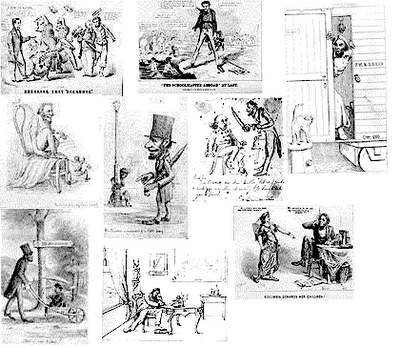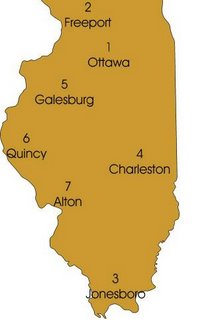Northern Valley Beacon
Information, observations, and analysis from the James River valley on the Northern Plains----- E-Mail: Enter 'Beacon' in subject box. Send to: Minnekota@Referencedesk.orgSaturday, December 09, 2006
What would Lincoln do?
We live in a time when Abraham Lincoln's presence is obvious. He is the lead subject of a national magazine edition. Bloggers, as happened in South Dakota this past week, post on him and discuss him almost as much as they discuss each other. Scholarly web sites are filled with lively exchanges of information about him. There is a reason.
Whenever our country reaches a time when political hostilities threaten to divide the people into warring camps, our own Civil War is invoked. The nation survived it, and we ask how, and we are ultimately led to Abraham Lincoln.

No major figure in American history was as vilified or made fun of as much as Abraham Lincoln. And no American figure has received as much analytical attention as Lincoln. The continuing fascination with and relevance of Lincoln comes from his unpretentious and ordinary manhood. He had only about a year of formal schooling, he had his share of failures, he said some intemperate things (one of which led him to a duel which he was talked out of at the last minute), and he was plagued by depression and doubt. But he is a demonstration of what a person of undistinguished origins can accomplish. And 150 years of constant scholarship, analysis, and criticism have distilled the essential character of Lincoln from the dross that swirls around any American who reaches distinction. Lincoln had all the attributes that can drive a person, but he also had a unique intellect and character. What distinguishes Lincoln is that through all the vilification and denunciation and assassinaiton plots against him, he was without malice. Historian Richard Hofstadter in American Political Tradition sums up this quality and why it is so pertinent to our own time:
Another aspect of that man and that time that reflects on what we may becoming is the Lincoln-Douglas debates. In the late summer and early fall of 1994, C-Span sponsored re-enactments of the debates at the seven localities in Illinois where they were held. Four of those sites were in the coverage area of the newspaper I worked for, and I had visited those sites many years before with a sense of their being hallowed ground. Then when the C-Span series of recreations was planned, a higher education institution with which I was associated offered credit in history, political science, and rhetorical studies to students who wanted to do independent study. I was privileged to work with some students in communicaitons and rhetorical studies to develop study plans. The re-enactments were preceded by 90-minute previews of each debate. In the debates, the first debater was given an hour to make his case, the second debater was given an hour and a half to respond, and the first debater was then given a half hour for rebuttal. The debates themselves took about three hours. The sites of the seven debates are shown on the map to the right.
In the debates, the first debater was given an hour to make his case, the second debater was given an hour and a half to respond, and the first debater was then given a half hour for rebuttal. The debates themselves took about three hours. The sites of the seven debates are shown on the map to the right.
I found it strangely pleasant to sit before the television for those Saturday afternoons in 1994 and see my home state and contemplate how thousands and thousands of people would gather for three hours and listen to the extended arguments and comments of politicians. I think now how this contasts with the reductive and distorting quips that pass for political commentary on blogs.
But those Saturday afternoons were well spent because I had the chance to participate in the study of those debates with students who were exploring the essential character of America and why this democracy, which people like Thomas Carlyle thought was an absurdity, succeeded.
The videos of those re-enactments are available from C-Span, and my colleagues inform me they are available at about $40 a debate at this time.
It may well be true that the kind of discourse which provided the impetus behind our nation's emergence from its darkest hour is no longer relevant to our time. But some of us will still look to Lincoln, not out of hero worship, but for the highly refined and tested knowledge of what it took for America to avoid disintegration and to survive 146 years ago.
Whenever our country reaches a time when political hostilities threaten to divide the people into warring camps, our own Civil War is invoked. The nation survived it, and we ask how, and we are ultimately led to Abraham Lincoln.

No major figure in American history was as vilified or made fun of as much as Abraham Lincoln. And no American figure has received as much analytical attention as Lincoln. The continuing fascination with and relevance of Lincoln comes from his unpretentious and ordinary manhood. He had only about a year of formal schooling, he had his share of failures, he said some intemperate things (one of which led him to a duel which he was talked out of at the last minute), and he was plagued by depression and doubt. But he is a demonstration of what a person of undistinguished origins can accomplish. And 150 years of constant scholarship, analysis, and criticism have distilled the essential character of Lincoln from the dross that swirls around any American who reaches distinction. Lincoln had all the attributes that can drive a person, but he also had a unique intellect and character. What distinguishes Lincoln is that through all the vilification and denunciation and assassinaiton plots against him, he was without malice. Historian Richard Hofstadter in American Political Tradition sums up this quality and why it is so pertinent to our own time:
Lincoln's rage for personal success, his external and worldly ambition, was quieted when he entered the White House, and he was at last left alone to reckon with himself. To be confronted with the fruits of his victory only to find that it meant choosing between life and death for others was immensely sobering.... In one of his rare moments of self-revelation he is reported to have said: "Now I don't know what the soul is, but whatever it is, I know that it can humble itself."...Lincoln's utter lack of personal malice during these years, his humane detachment, his tragic sense of life has no parallel in political history....Lincoln was moved by the wounded and dying men, moved as no one in a place of power can afford to be....For him it was impossible to drift into the habitual callousness of the sort of officialdom that sees men only as pawns to be shifted here and there and "expended" at the will of others. It was a symbolic thing that his office was so constantly open, that he made himself more accessible than any other chief executive in our history. ...Is it possible to recall anyone else in modern history who could exercise soCarl Sandburg captures a moment of that personal eminence in his biography of Lincoln. Lincoln insisted on visiting the sick and wounded soldiers during the Civil War. On one occasion an army doctor told him he did not want to venture into one of the hospital tents because rebel prisoners were in it. "That is just where I want to go," said Lincoln, and he went from cot to cot shaking hands with the prisoners. When he reached the bed of a Confederate colonel, the man said, "Mr. President, do you know to whom you offer your hand?" Lincoln said, "I do not." The colonel said, Well, you offer it to a Confederate colonel who has fought you as hard as he could for four years." And Lincoln said, "Well, I hope a Confederate colonel will not refuse me his hand." And the colonel clasped Lincoln's hand in both of his as they exchanged respect and admiration.
much power and yet feel so slightly the private corruption that goes with it? Here, perhaps, is the best measure of Lincoln's personal eminence in the human calendar--that he was chastened and not intoxicated by power.
Another aspect of that man and that time that reflects on what we may becoming is the Lincoln-Douglas debates. In the late summer and early fall of 1994, C-Span sponsored re-enactments of the debates at the seven localities in Illinois where they were held. Four of those sites were in the coverage area of the newspaper I worked for, and I had visited those sites many years before with a sense of their being hallowed ground. Then when the C-Span series of recreations was planned, a higher education institution with which I was associated offered credit in history, political science, and rhetorical studies to students who wanted to do independent study. I was privileged to work with some students in communicaitons and rhetorical studies to develop study plans. The re-enactments were preceded by 90-minute previews of each debate.
 In the debates, the first debater was given an hour to make his case, the second debater was given an hour and a half to respond, and the first debater was then given a half hour for rebuttal. The debates themselves took about three hours. The sites of the seven debates are shown on the map to the right.
In the debates, the first debater was given an hour to make his case, the second debater was given an hour and a half to respond, and the first debater was then given a half hour for rebuttal. The debates themselves took about three hours. The sites of the seven debates are shown on the map to the right.I found it strangely pleasant to sit before the television for those Saturday afternoons in 1994 and see my home state and contemplate how thousands and thousands of people would gather for three hours and listen to the extended arguments and comments of politicians. I think now how this contasts with the reductive and distorting quips that pass for political commentary on blogs.
But those Saturday afternoons were well spent because I had the chance to participate in the study of those debates with students who were exploring the essential character of America and why this democracy, which people like Thomas Carlyle thought was an absurdity, succeeded.
The videos of those re-enactments are available from C-Span, and my colleagues inform me they are available at about $40 a debate at this time.
It may well be true that the kind of discourse which provided the impetus behind our nation's emergence from its darkest hour is no longer relevant to our time. But some of us will still look to Lincoln, not out of hero worship, but for the highly refined and tested knowledge of what it took for America to avoid disintegration and to survive 146 years ago.
Archives
May 2005 June 2005 July 2005 August 2005 September 2005 October 2005 November 2005 December 2005 January 2006 February 2006 March 2006 April 2006 May 2006 June 2006 July 2006 August 2006 September 2006 October 2006 November 2006 December 2006